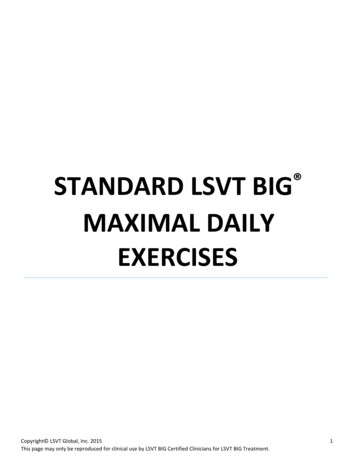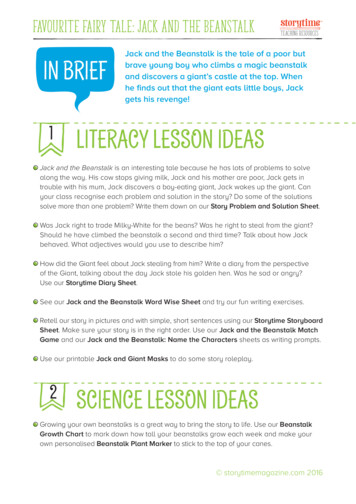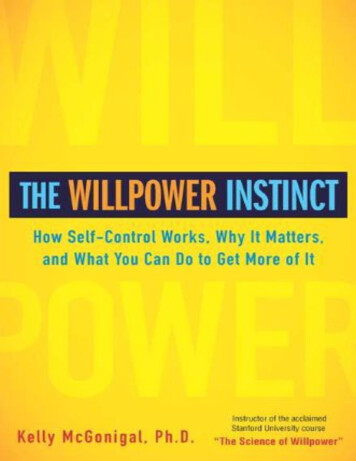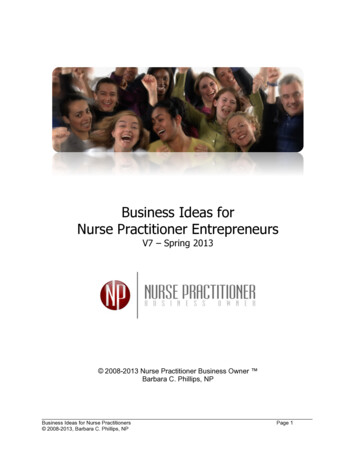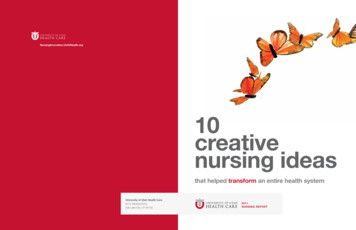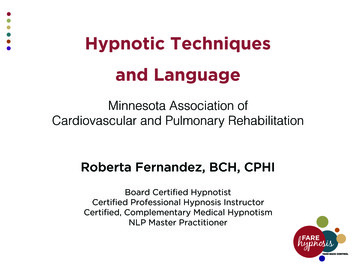
Transcription
WillpowerTHE BIG IDEASRediscovering the Greatest Human StrengthEat Your Way to WillpowerBY ROY F. BAUMEISTER AND JOHN TIERNEY · PENGUIN GROUP 2011 · 304 PAGESNo glucose, no willpower.Exercise Self-ControlAnd improve your life.Precommitment.It’s huge.Tidy Up!And improve your willpower.MeditationAnaerobic conditioning for selfcontrol.Bright LinesAre good lines.Commitment StrategiesUse them to conserve willpower.The Willpower Game“The result, after dozens of experiments in Baumeister’s lab and hundredselsewhere, is a new understanding of willpower and of the self. We want totell you what’s been learned about human behavior, and how you can use it tochange yourself for the better. Acquiring self-control isn’t as magically simpleas the techniques in modern self-help books, but neither does it have to be asgrim as the Victorians made it out to be. Ultimately, self-control lets you relaxbecause it removes stress and enables you to conserve willpower for the importantchallenges. We’re confident that this book’s lessons can make your life not justmore productive and fulfilling but also easier and happier. And we can guaranteethat you will not have to endure any sermons against bare ankles.”Play offense rather than defense. Roy Baumeister & John Tierney from WillpowerWillpower.It’s ESSENTIAL to optimizing our lives.In fact, in their *great* book, Willpower, Roy Baumeister (one of the world’s leading scientificresearchers on self-control) and John Tierney (science writer for the New York Times) tell usthat “Improving willpower is the surest way to a better life.”I absolutely loved this book. It’s an easy read and packed with goodness.I’m excited to share a few of my favorite Big Ideas on how we can get our willpower on!“Improving willpower is thesurest way to a better life.” Roy Baumeister & John TierneyLet’s jump in.EAT YOUR WAY TO WILLPOWER“Now that we’ve surveyed the problems caused by lack of glucose, we can turn to solutionsand to cheerier topics, like good meals and long naps. Here are some lessons and strategies forputting glucose to work for you: Feed the beast. By beast, we don’t mean Beelzebub. We meanthe potential demon inside you or anyone spending time with you. Glucose depletion can turnthe most charming companion into a monster. The old advice about eating a good breakfastapplies all day long, particularly on days when you’re physically or mentally stressed. If you havea test, an important meeting, or a vital project, don’t take it on without glucose. Don’t get intoan argument with your boss four hours after lunch. Don’t thrash out serious problems with yourpartner just before dinner.”Glucose.It’s the key to willpower.Seriously. :)As Baumeister and Tierney tell us: “No glucose, no willpower.”1PhilosophersNotes Willpower
The quickest way to blow your willpower is to let your glucose get low. So, don’t make anyimportant decisions or discuss any serious issues when you need to eat.“Self-control is a vitalstrength and key tosuccess in life.” Roy Baumeister & John TierneySome tips on how to keep the glucose steady: “To maintain steady self-control, you’re better offeating foods with a low glycemic index: most vegetables, nuts (like peanuts and cashews), manyraw fruits (like apples, blueberries, and pears), cheese, fish, meat, olive oil, and other “good” fats.(These low-glycemic foods may also help keep you slim.)”EXERCISE SELF-CONTROL: IMPROVE YOUR LIFE“Exercising self-control in one area seemed to improve all areas of life. They smoked fewercigarettes and drank less alcohol. They kept their homes cleaner. They washed dishes insteadof leaving them stacked in the sink, and did their laundry more often. They procrastinated less.They did their work and chores instead of watching television or hanging out with friends first.They ate less junk food, replacing their bad eating habits with healthier ones.”We touched on this Idea in our Notes on Heidi Grant Halvorson’s great book Succeed and KellyMcGonigal’s equally great book The Willpower Instinct.Here’s how McGonigal puts it in The Willpower Instinct: “Other studies have found thatcommitting to any small, consistent act of self-control— improving your posture, squeezinga handgrip every day to exhaustion, cutting back on sweets, and keeping track of yourspending—can increase overall willpower. And while these small self- control exercises mayseem inconsequential, they appear to improve the willpower challenges we care about most,including focusing at work, taking good care of our health, resisting temptation, and feeling“For most of us, though,the problem is not a lack ofgoals but rather too manyof them.”more in control of our emotions.”Good to know: As we build self-control in one aspect of our lives we tend to build more selfcontrol across other domains.Me likes. :) Roy Baumeister & John TierneyPRECOMMITMENT“The essence of this strategy is to lock yourself into a virtuous path. You recognize that you’ll faceterrible temptations to stray from the path, and that your willpower will weaken. So you make itimpossible—or somehow unthinkably disgraceful or sinful—to leave the path. Precommitmentis what Odysseus and his men used to get past the deadly songs of the Sirens. He had himselflashed to the mast with orders not to be untied no matter how much he pleaded to be freedto go to the Sirens. His men used a different form of precommitment by plugging their earsso they couldn’t hear the Sirens’ songs. They prevented themselves from being tempted at all,which is generally the safer of the two approaches. If you want to be sure you don’t gamble ata casino, you’re better off staying out of it rather than strolling past the tables and counting onyour friends to stop you from placing a bet. Better yet is to put your name on the list of people(maintained by casinos in some states) who are not allowed to collect any money if they placewinning bets.”Precommitment.It’s H.U.G.E.Whether you’re Odysseus or a normal mortal, it’s *much* easier to decide in advance what youwill or will not do then wait until the heat of the moment.Here’s how Kelly McGonigal puts it in her The Willpower Instinct: “Cortés knew that whenthey faced their first battle, the crew would be tempted to retreat if they knew they had theoption to sail away. So according to legend, he ordered his officers to set the ships on fire.The ships—Spanish galleons and caravels—were made entirely of wood and waterproofed2PhilosophersNotes Willpower
with an extremely flammable pitch. Cortés lit the first torch, and as his men destroyed the“To get the most out ofyour willpower, use it toset aside enough time tosleep. You’ll behave betterthe next day—and sleep moreeasily the next night.” Roy Baumeister & John Tierneyships, they burned to the water line and sank. This is one of history’s most notorious examplesof committing one’s future self to a desired course of action. In sinking his ships, Cortésdemonstrated an important insight into human nature. While we may feel brave and tirelesswhen we embark on an adventure, our future selves may be derailed by fear and exhaustion.Cortés burned those ships to guarantee that his men didn’t act on their fear. He left thecrew—and all their future selves—with no choice but to go forward. This is a favorite story ofbehavioral economists who believe that the best strategy for self-control is, essentially, to burnyour ships. One of the first proponents of this strategy was Thomas Schelling, a behavioraleconomist who won the 2005 Nobel Prize in Economic Sciences for his Cold War theory of hownuclear powers can manage conflict. Schelling believed that to reach our goals, we must limitour options. He called this precommitment.”Here’s some more mojo from Baumeister and Tierney: “Of course, it’s even easier to avoidrunning up debt at a clothing store if you go there without a credit card. Precommitment is theultimate offensive weapon. Buy junk food in small packages or keep them out of the kitchenaltogether. Plan meals by the week, rather than on the spur of the moment when it’s already pastdinnertime and you’re starving. If you’re planning to have a child, set up an automatic payrolldeduction plan to build up a nest egg of ten thousand dollars so you’re not stressed out by moneyduring those first sleepdeprived months of parenthood. If you have a gambling problem and aregoing someplace where there’s a casino, sign up ahead of time for the self-exclusion list (whichwill prevent you from collecting any winnings). To precommit to the Nothing Alternative, use asoftware program (like the one named Freedom) that locks you off the Internet for a set period.”How can YOU step up your precommitment and play some more offense?! :)Get on that!TIDY UP!“Another simple old-fashioned way to boost your willpower is to expend a little of it on neatness.As we described in chapter 7, people exert less self-control after seeing a messy desk than afterseeing a clean desk, or when using a sloppy rather than a neat and well organized Web site. Youmay not care about whether your bed is made and your desk is clean, but these environmentalcues subtly influence your brain and your behavior, making it ultimately less of a strain tomaintain self-discipline. Order seems to be contagious.”How amazing is that?The tidiness of our environment affects our willpower.* organizes desk a bit *“The Two-Minute Rule: Ifsomething will take lessthan two minutes, don’t putit on a list. Get it out ofthe way immediately.” Roy Baumeister & John TierneyYou make your bed this morning?House clean?Desk tidy?We may not be consciously aware of it, but research shows that environmental cues subtlyinfluence our brain and our behavior so here’s to investing a bit of our willpower to creating alittle more order in our lives! :)MEDITATION: ANAEROBIC WORKOUT FOR SELF-CONTROL“Religious meditations often involve explicit and effortful regulation of attention. The beginner’sexercise in Zen meditation is to count one’s breaths up to ten and then do it again, over andover. The mind wanders quite naturally, so bringing it back to focus narrowly on one’s breathingPhilosophersNotes Willpower3
“People with good selfcontrol mainly use it notfor rescue in emergenciesbut rather to developeffective habits androutines in school and atwork.” Roy Baumeister & John Tierneybuilds mental discipline. So does saying the rosary, chanting Hebrew psalms, repeating Hindumantras. When neuroscientists observe people praying or meditating, they see strong activityin two parts of the brain that are also important for self-regulation and control of attention.Psychologists see an effect when they expose people to religious words subliminally, meaningthat the words are flashed on a screen so quickly that the people aren’t consciously aware of whatthey’ve seen. People who are subliminally exposed to religious words like God or Bible becomeslower to recognize words associated with temptations like drugs or premarital sex. “It looks as ifpeople come to associate religion with tamping down these temptations,” says McCullough, whosuggests that prayers and meditation rituals are “a kind of anaerobic workout for self-control.””I just love that image of prayers/meditation as “anaerobic workouts for self-control.”Just like we go to the gym to build our muscles, we sit in silence meditating to build our mentalmuscles.It doesn’t matter whether we’re counting our breaths from one to ten or saying the rosary,chanting Hebrew psalms or repeating Hindu mantras.They ALL build our mental discipline.And, as we know by this point, having the ability to put our attention where we want, when wewant is a VERY good thing.Plus, we also get the benefits of eliciting what Herbert Benson calls “The Relaxation Response”(see Notes).Here’s a little more McGonigal wisdom from The Willpower Instinct: “One study found thatjust three hours of meditation practice led to improved attention and self-control. Aftereleven hours, researchers could see those changes in the brain. The new meditators hadincreased neural connections between regions of the brain important for staying focused,ignoring distractions, and controlling impulses. Another study found that eight weeks of dailymeditation practice led to increased self-awareness in everyday life, as well as increased graymatter in corresponding areas of the brain. It may seem incredible that our brains can reshapethemselves so quickly, but meditation increases blood flow to the prefrontal cortex, in muchthe same way that lifting weights increases blood flow to your muscles. The brain appears toadapt to exercise in the same way that muscles do, getting both bigger and faster in order toget better at what you ask of it.”“Focus on one project ata time. If you set morethan one self-improvementgoal, you may succeed for awhile by drawing on reservesto power through, butthat just leaves you moredepleted and more prone toserious mistakes later.” Roy Baumeister & John TierneyPowerful stuff.You meditating yet?Now a good time to start/turn up your practice? :)BRIGHT LINES“He needs the help of “bright lines,” a term that Ainslie borrows from lawyers. These are clear,simple, unambiguous rules. You can’t help but notice when you cross a bright line. If youpromise yourself to drink or smoke “moderately,” that’s not a bright line. It’s a fuzzy boundarywith no obvious point at which you go from moderation to excess. Because the transition is sogradual and your mind is so adept at overlooking your own peccadilloes, you may fail to noticewhen you’ve gone too far. So you can’t be sure you’re always going to follow the rule to drinkmoderately. In contrast, zero tolerance is a bright line: total abstinence with no exceptionsanytime. It’s not practical for all self-control problems—a dieter cannot stop eating all food—butit works well in many situations. Once you’re committed to following a bright-line rule, yourpresent self can feel confident that your future self will observe it, too. And if you believe that therule is sacred—a commandment from God, the unquestionable law of a higher power—then itbecomes an especially bright line. You have more reason to expect your future self to respect it,4PhilosophersNotes Willpower
and therefore your belief becomes a form of self-control: a self-fulfilling mandate. I think I won’t,“The results showed that anarrow, concrete, here-andnow focus works againstself-control, whereas abroad, abstract, long-termfocus supports it.” Roy Baumeister & John Tierneytherefore I don’t.”Bright lines.This is another incredible idea.As we discuss often throughout these Notes, 99% is a challenge; 100% is a breeze. (Thanks, JackCanfield!)As Baumeister and Tierney point out, it’s a LOT easier to say you’re simply not going to drinkthan to say you’re going to drink “moderately.”It’s also a lot easier to say you will meditate every day for at least 10 minutes than to say you’llmeditate “more often.”One’s a fuzzy line.The other is a BRIGHT line.We want bright lines.You have any fuzzy commitments you can brighten up?What can you make a 100% (!!!) non-negotiable commitment to?Get on that. And, know that it’s a LOT easier to make that clear, bright-lined precommitmentthan it is to stay fuzzy!CONSERVE WILLPOWER THRU COMMITMENT STRATEGIES“When you’re not starving, when you have glucose, you can prepare for the battle of the bulgewith some of the classic self-control strategies, starting with precommitment. The ultimatesurefire form of precommitment—the true equivalent of Odysseus tying himself to the mast—would be gastric bypass surgery, which would physically prevent you from eating, but there arelots of more modest forms. You can begin by simply keeping fattening food out of reach and outof sight. You’ll conserve willpower (as the women in the experiment did when the M&M’s weremoved out of reach) at the same time that you’re avoiding calories. In one experiment, officeworkers ate a third less candy when it was kept inside a drawer rather than on top of their desks.A simple commitment strategy for avoiding late-night snacking is to brush your teeth early in theevening, while you’re still full from dinner and before the late-night-snacking temptation sets in.Although it won’t physically prevent you from eating, brushing your teeth is such an ingrainedpre-bedtime habit that it unconsciously cues you not to eat anymore. On a conscious level,moreover, it makes snacking seem less attractive: You have to balance your greedy impulse forsugar against your lazy impulse to avoid having to brush your teeth again.”This is great.Reminds me of Dan Millman’s great wisdom from Everyday Enlightenment (see Notes) wherehe tells us: “Make any positive behavior as convenient as possible. To break my habit ofsnacking in the evenings, I keep dental floss and a toothbrush in the downstairs bathroom nearthe kitchen. Right after dinner I floss and brush. I’m far less likely to snack, because if I eatsomething, I have to floss and brush all over again.Make any negative behavior as inconvenient as possible. To smoke less, keep only one pack ofcigarettes at home, in a small locked safe under some luggage in the closet in the garage. Youmight also put the television in that same closet, so you take it out only for special events, anduse your old TV time writing that book, painting that picture, or learning a new language. Inthis way you replace old negative routines with new behaviors, pouring new energy into a newyou.”PhilosophersNotes Willpower5
There ya go.How can you implement some commitment strategies to your life?!WILLPOWER GAME: PLAY OFFENSE INSTEAD OF DEFENSE“Forget about self-esteem.Work on self-control.” Roy Baumeister & John Tierney“People with good self-control mainly use it not for rescue in emergencies but rather to developeffective habits and routines in school and at work. The results of these habits and routines weredemonstrated in yet another recent set of studies, in the United States, showing that people withhigh self-control consistently report less stress in their lives. They use their self-control not to getthrough crises but to avoid them. They give themselves enough time to finish a project; they takethe car to the shop before it breaks down; they stay away from all-you-can-eat buffets. They playoffense instead of defense.”Love this.We want to use our willpower to develop effective habits—playing offense instead of defense.We want to use our willpower “Not to get through crises but to avoid them.”The result?We live with a *lot* less stress.So, let’s get on that! :)Brian Johnson,Chief PhilosopherIf you liked this Note,you’ll probably like The Willpower InstinctAbout the Author of “Willpower”ROY F. BAUMEISTER AND JOHN TIERNEYRoy F. Baumeister directs the social psychology program at Florida StateThe Power of HabitUniversity. He has written for more than 450 scientific publications andSucceedconsistently ranks among the world’s most frequently cited psychologists. This isThe How of HappinessThe Happiness Hypothesishis twenty-eighth book.John Tierney writes the “Findings” science column for the New York Times.His writing has won awards from the American Association for the Advancementof Science and the American Institute of Physics. This is his third book.About the Author of This NoteBRIAN JOHNSONBrian Johnson is a lover of wisdom (aka a “Philosopher”) and a passionatestudent of life who’s committed to inspiring and empowering millions of peopleto live their greatest lives as he studies, embodies and shares the universal truthsof optimal living. He harts his job.6PhilosophersNotes Willpower
McGonigal’s equally great book The Willpower Instinct. Here’s how McGonigal puts it in The Willpower Instinct: “Other studies have found that committing to any small, consistent act of self-control— improving your posture, squeezing a handgrip every day to exha


